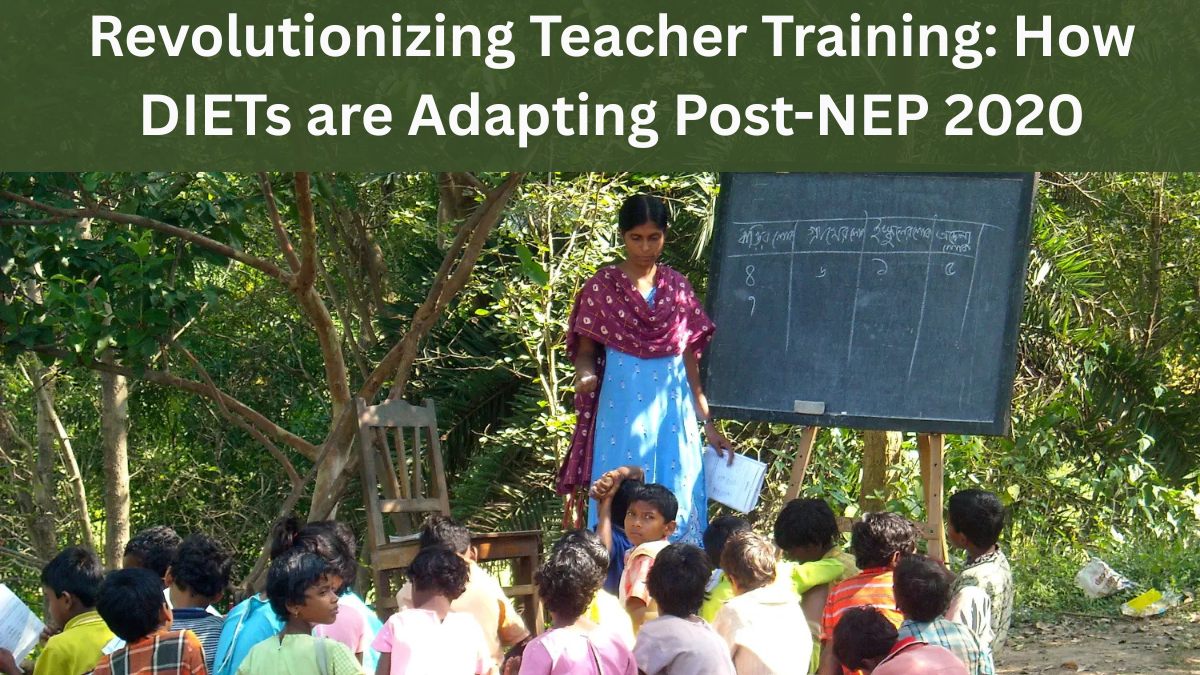Education in India is not just a profession, but the foundation of nation building. And the pillars that strengthen this foundation are – teachers. The more competent, sensitive and innovative the teachers are, the brighter the future of the children will be. Based on this thinking, the new National Education Policy 2020 (NEP 2020) was introduced, an important aspect of which is – improvement in teacher training.
The institutions that have the biggest responsibility of implementing this change at the ground level are – DIETs (District Institute of Education and Training). Let us know in detail in this article how DIETs are changing themselves in accordance with NEP 2020, and how this change is empowering teachers and the education system.
What are DIETs and what is their role?
DIET means District Level Teacher Training Institute, which was established by the Government of India in 1987. Their main objective has been to train elementary level teachers, implement policies and do research by understanding local educational needs.
After NEP 2020, the role of DIET has gone beyond being a simple training institute. Now these institutes have become the centers of social, technological and innovative reforms of education.
Objective of NEP 2020 and impact on teacher training
The goal of NEP 2020 is not to impart only bookish knowledge, but to promote “holistic development” – that is, to develop critical thinking, creativity, ethical values and life skills in students.
That is why according to NEP 2020, now teachers are being taught not only to teach content but to guide the overall development of children. To realize this goal, DIETs have made radical changes in their training structure, curriculum and approach.
New framework of teacher training: 4-year B.Ed program
Under NEP 2020, there is a plan to make a 4-year integrated B.Ed program mandatory for all new teachers in the country by the year 2030. DIETs are no longer limited to just the D.El.Ed curriculum. Now these institutes are also being prepared for Integrated Teacher Education Program (ITEP).
This course integrates pedagogy, subject-based knowledge, practical training and digital learning, so that teachers can be equipped with multidimensional skills.
Moving towards digital technology and smart classrooms
The COVID-19 pandemic made it clear that the future of education is linked to digital means. Understanding this, DIETs have started training their trainers and teachers in online teaching tools, LMS, smart boards, and e-content development.
Now teachers are not limited to just the blackboard, they are now teaching children through online resources, game-based learning and digital activities.
Introduction of Bloom’s Taxonomy and holistic assessment
Under NEP 2020, there is talk of ending the rote learning system only. DIETs are now teaching teachers through models like Bloom’s Taxonomy that the aim of education should be the lasting understanding and practical use of knowledge.
To implement CCE (Continuous and Comprehensive Evaluation), DIET has adopted new methods of assessment – such as portfolio assessment, project-based learning and observational assessment.
Special focus on language and mother tongue
According to NEP 2020, mother tongue/local language has been given priority in elementary education. In this direction, DIET is training local teachers to prepare teaching material in regional languages, adopt bilingual teaching methods and strengthen the linguistic identity of children.
Role of the teacher: From ‘guide’ to ‘mentor’
Today, teachers are not only a source of knowledge, but also a guide, mentor and social leader. DIET is now orienting teachers towards leadership skills, mental health, emotional intelligence and compassionate teaching.
Teachers are also being taught how they can develop 21st century skills in children – such as teamwork, creativity and innovation.
Community engagement and parent involvement
NEP 2020 has described building a bridge between the community and the school as extremely important. DIET is now developing the SCP (School-Community Partnership) model among trainers and teachers.
Teachers are now being taught how regular dialogue with parents, community-based activities and local culture can be included in the curriculum.
Promotion of research, innovation and work-based learning
Now DIETs are not just training centers, but are becoming laboratories of research and innovation. Under NEP 2020, teachers are being trained in Action Research, Reflective Practice and Problem-Based Learning.
DIET now expects teachers to present innovative modules and local solutions so that education can be connected to the real life of children.
Challenges and way forward
Although these changes in DIETs are welcome, there are many challenges too – like shortage of staff, funding, lack of digital resources, access in rural areas etc.
Despite these challenges, DIETs are constantly striving to develop an inclusive, quality and practical teacher training model that will make India’s education sector globally competitive in the times to come.
Conclusion
NEP 2020 has paved the way for a practical revolution, not a theoretical one, in India’s education system. The results of this revolution are:
